
Louis Figuier was a French scientist and writer. He was the nephew of Pierre-Oscar Figuier and became Professor of chemistry at L'Ecole de pharmacie of Montpellier. Louis Figuier was married to French writer Louise Juliette Bouscaren.
Bernard Lugan is a French historian who specialises in African history. He is a professor at the Institut des hautes études de défense nationale (IHEDN) and the editor of the journal L'Afrique réelle. Lugan previously taught at Jean Moulin University Lyon 3 and at the special military school of Saint-Cyr until 2015. He served as an expert witness for Hutu defendants involved in the Rwandan genocide at the International Criminal Tribunal for Rwanda. Close to the far-right, Lugan is a self-declared monarchist and right-wing anarchist.

Adolphe Vuitry was a French lawyer, economist and politician. He became recognized as an expert on finance. He was governor of the Banque de France from 1863 to 1864, then Minister-President of the Conseil d'Etat from 1864 to 1869. In his later years he devoted himself to historical studies, publishing many works on medieval and modern finance.

Pierre Paul Nicolas Henrion de Pansey was a French jurist and politician. He was briefly Minister of Justice in the French provisional government of 1814 formed after the defeat of Napoleon. He was one of the presidents of the Court of Cassation, a final court of appeal in France. He wrote several major works on jurisprudence.

Jules Godin was a French lawyer and politician of the French Third Republic. He was Deputy of French India from 1876 to 1881 and Senator of French India from 1891 to 1909. He was briefly Minister of Public Works in 1898.
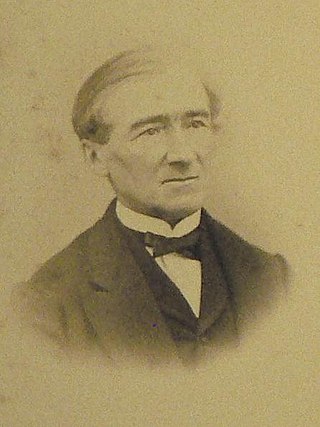
Louis-Étienne Jousserandot was a 19th-century French lawyer, journalist and writer. He was prefect of Pyrénées-Orientales then of Marne under the French Third Republic.
Anatole Loquin was a French writer, comptroller of Customs and musicologist. He also wrote under the pseudonyms Paul Lavigne, Louis Sévin et Ubalde.
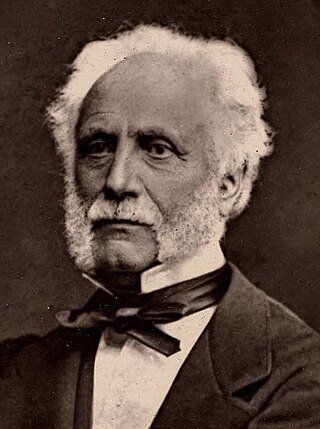
Charles Ignace Plichon was a French lawyer, businessman and politician. As a young man he was attracted to the social idealism of Saint-Simonianism. In 1841–42 he undertook a diplomatic and exploratory mission to the regency of Tunis, which was seeking French protection from the Turks In 1844–45 he travelled in Egypt to obtain information about the proposed Suez Canal, and returned via Palestine, Syria and Turkey. He represented Hazebrouck in the Nord department as a deputy in the last years of the July Monarchy. He avoided politics during the French Second Republic and the early years of the Second French Empire, then again represented Hazebrouck as a champion of Catholic and protectionist interests from 1857 until his death in 1888. He made a fortunate marriage through which he became President of the Compagnie des mines de Béthune. He was briefly Minister of Public Works in 1870.
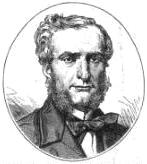
Théodore Tenaille-Saligny was a French lawyer, civil servant and politician. He came from a prosperous family, was a convinced republican, but was a strong opponent of the Paris Commune. During the French Third Republic he served several times as a departmental prefect. He made a number of attempts in national elections before finally becoming Senator for Nièvre from 1879 to 1888.
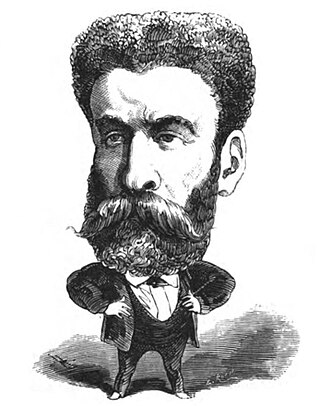
Edgar Raoul-Duval was a French magistrate and politician who was Representative of Seine-Inférieure and then twice Deputy of Eure. He had right-wing views, and for most of his career he was a Bonapartist. He was a passionate orator, but somewhat inconsistent in his politics.

Arthur Legrand was a French lawyer, public servant and politician who represented Manche in the legislature almost continuously from 1871 to his death in 1916. His political beliefs were Bonapartist and conservative at first, and later he ran as an independent..
Michel Etienne Anthelme Théodore Grandperret was a French lawyer and politician. He was a staunch Bonapartist. He served briefly as Minister of Justice and Religious Affairs during the last weeks on the Second French Empire. Later he was a Life Senator from 1877 to his death.

Viscount Charles-André de La Jaille was a French general who campaigned in the Crimea, Italy and Mexico, fought in the Franco-Prussian War of 1870 and helped supress the Paris Commune the next year. He was monarchist Senator of Guadeloupe from 1876 to 1885.

Jacques Marcel Lucet was a French advocate and politician. He was a committed Republican, supported the French Third Republic (1848–51), and was forced into exile during the Second French Empire, first in Italy and then in Algeria. During the French Third Republic he was deputy and then senator of the department of Constantine, Algeria, from 1871 to 1883.
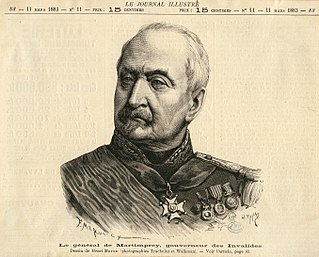
Count Edmond-Charles de Martimprey was a French soldier, briefly Governor General of Algeria, and then Senator of France for the remainder of the Second French Empire.

Rémy Jacques was a French lawyer and politician. He represented the department of Oran, French Algeria, in the National Assembly and then the Chamber of Deputies from 1871 to 1882. He was then Senator of Oran from 1882 to 1900.
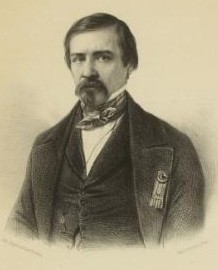
Marius Étienne de Voisins-Lavernière was a French landowner and politician. He was a Deputy of Tarn during the French Second Republic, then Senator of Tarn during the French Third Republic.

Sander Rang or Paul Charles Leonard Alexander Rang was a French conchologist and interpreter of Arabic texts. He was, in 1816, one of the survivors of the sinking of the frigate Medusa, on which he was an ensign. He spent a good part of his life in La Rochelle, where he published his early zoological observations, in particular in the bulletins of the Society of Natural Sciences of Charente-Maritimes.In 1841 Rang was one of the founding members of the Société des Amis des Arts now the Musée des Beaux-Arts de La Rochelle.He specialised in marine fauna notably in sea hares, cephalopods and other molluscs and on the heterogenous group known as zoophytes. Sander Rang described many new mollusc species including the sea hares Aplysia dactylomela, Dolabrifera dolabrifera, the cuttlefish Sepia hierredda and the land snails Striosubulina striatella, Pleurodonte desidens and Opeas hannense.

Adine Riom, née Alexandrine Louise Claudine Broband was a French writer, poet, and playwright.

Baron Alban Emmanuel Guillaume-Rey was a French archaeologist, topographer and orientalist. He is known for his historical works on Crusader states and on military fortifications in the Near East. He is considered by some as the first archeologists of the Crusades.


















